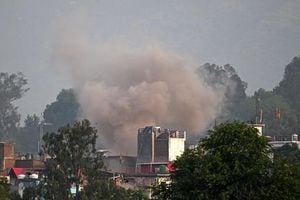In a case reflecting the intersection of personal lifestyle and political tension, Iran is pressing Spain to extradite Sasha Sobhani, the son of a former Iranian diplomat. The 33-year-old musician has become notable not just for his luxurious lifestyle, documented extensively on social media, but also for the serious allegations leveled against him by the Iranian government, including accusations of running illegal gambling websites. After a court appearance in Madrid, where Sobhani denied these charges, the situation is casting a spotlight on issues of human rights and state repression associated with Iran's authoritarian regime.
Sasha Sobhani appeared in Madrid’s court to respond to an extradition request from Iran, which accuses him of operating online gambling platforms and engaging in money laundering. The response to this request has highlighted not just legal, but also ethical implications, as Sobhani fears for his life if he is returned to his home country. In his own words, he indicated to the court, "If they send me back, they will torture me. I would prefer a grave in Spain than a prison in Iran, but I trust Spanish justice." This declaration serves as a stark reminder of the potential consequences of dissent in a repressive political climate.
Sobhani's life has unfolded in a way that is emblematic of the struggles faced by many young Iranians today. Much of his youth was spent outside of Iran due to his father's diplomatic career, which took them to various countries including Armenia, Gabon, and Venezuela. After his father's assignment concluded in Venezuela, Sobhani remained there while his father served under the conservative government of Mahmoud Ahmadinejad. Eventually, Sobhani returned to Iran and quickly made a name for himself on social media as one of the 'Rich Kids of Tehran'.
This social media persona was not without its perils. His lifestyle, characterized by ostentatious displays of wealth and parties that flouted Iranian strictures on social behavior, put him at odds with authorities. After hosting raves in Tehran, Sobhani was arrested and later fled to Turkey before eventually settling in Spain. In Madrid, he has continued his controversial social media presence, flaunting his wealth and criticizing the Iranian government, gaining a following of 2.6 million on Instagram.
Critics of the Iranian regime have similarly utilized social media to express dissent and critique governmental policies. Sobhani stands out, however, due to his lineage and the explicit nature of his critiques. He has highlighted the disparity between the lives of the country's elite and the struggles of ordinary Iranians, stating, "I teach them how I live and tell them that they too could live like this. And of course, Iran cannot allow the son of a high official to say those things." His brash commentary and lifestyle are seen as direct challenges to a regime that prioritizes control over freedom.
The Iranian authorities have now classified Sobhani as a serious legal target, leading to their request for his extradition under the pretext of crime. Last week, Spanish authorities began processing this request, marking a significant high-profile moment in international relations, emphasizing the complex narrative entwined with personal freedom and state enforcement.
Sobhani's case also highlights a broader crackdown within Iran against gambling and illicit activities associated with the growing online presence of influencers. Just recently, Iranian police reported detaining over 30 individuals on similar charges, underlining the government's increasing intolerance of activities that it deems contrary to its values. Moreover, the central bank has identified thousands of individuals involved in gambling, illustrating an intensified effort to clamp down on a popular yet illegal pastime within the nation.
As Sobhani awaits the decision on his extradition, many observers are closely watching how Spain will navigate the pressures from Iran, balanced against its own judicial principles and human rights obligations. Sobhani's request for asylum in Spain underscores the difficult position faced by many individuals who flee oppressive regimes but find themselves ensnared in complex legal battles abroad, combining aspects of freedom, safety, and the very real risks posed by state actors.
This unfolding situation encapsulates the critical importance of individual voices against formidable state structures and raises questions about the responsibilities of other nations when dealing with extradition requests that may have far-reaching human rights implications. Sobhani’s choices and the path he has taken reveal a struggle that resonates among a growing cohort of young Iranians seeking greater freedom and a life unencumbered by governmental watchfulness.
As investigations continue, the outcome of Sobhani’s legal plight will almost certainly influence the political discourse surrounding state authority and personal liberty, both within Iran and internationally. Many advocates hope that this case will shed light not only on the specific circumstances surrounding Sobhani but also on the broader implications for human rights in Iran, a country often criticized for its repressive techniques against dissenting voices.



